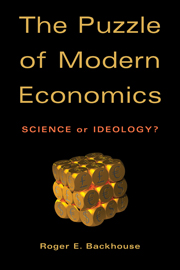1 - Introduction
Published online by Cambridge University Press: 05 June 2012
Summary
WHY DID NO ONE SEE IT COMING?
On 5 November 2008, Her Majesty Queen Elizabeth II was opening a new building at the London School of Economics. Speaking of the credit crunch, she turned to some of the economists present and said, ‘It's awful. Why did no one see it coming?’ Journalists, not constrained to be diplomatic, were more forthright in condemning economists. For Anatol Kaletsky, one-time economics editor of the Times, ‘Economists are the guilty men’ (the Times 5 February 2009). The economics editor of the Guardian, Larry Elliott, claimed that ‘as a profession, economics not only has nothing to say about what caused the world to come to the brink of financial collapse … but also a supreme lack of interest’ (the Guardian 1 June 2009). Writing in the same newspaper, Simon Jenkins attributed this failure to the fact that ‘Economists regard it as their duty fearlessly to offer government what it wants to hear. … Don't rock the boat, says the modern profession, and the indexed pension is secure.’ The whole economics profession, he contended, had ‘suffered a collapse’ (12 November 2008).
Even more significantly, prominent economists have argued that the profession has gone astray. Nobel Laureate Paul Krugman, whose academic career has taken him through some of the world's leading economics departments – MIT, Yale and Princeton – has endorsed the view that blame for the crisis falls on economists as well as on financiers, bankers and policy makers.
- Type
- Chapter
- Information
- The Puzzle of Modern EconomicsScience or Ideology?, pp. 1 - 14Publisher: Cambridge University PressPrint publication year: 2010



